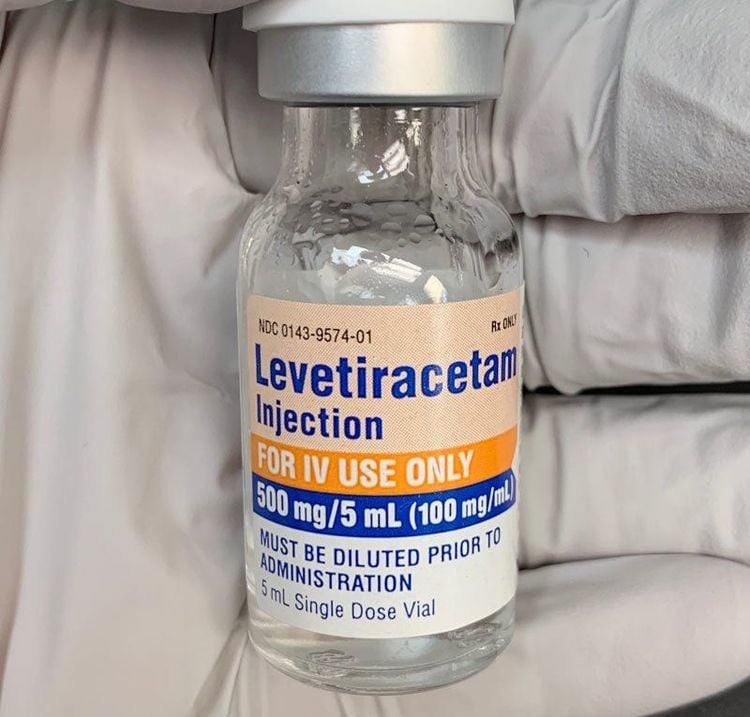This is an automatically translated article.
Epilepsy is one of the diseases that cause a lot of difficulties in diagnosis and treatment. For pregnant and lactating women, there is no absolutely safe epilepsy medicine to avoid. affect the fetus and child, the patient should follow the treatment regimen of the doctor.
1. Purpose of treatment of epilepsy during pregnancy
All epilepsy patients in general and pregnant women in particular are treated with at least one antiepileptic drug with the goal of ensuring control of the disease and preventing the patient from having seizures. out without deformities. In the case of using drugs to treat epilepsy in pregnant and lactating women, it is required to be absolutely safe, consistent with effective doses during pregnancy to ensure the comprehensive development of the fetus. .
When using drugs to treat epilepsy in pregnant and lactating women, all side effects can affect the development of the fetus, so it should be prevented and limited to a low level. to avoid consequences later on.
The steps for the use of antiepileptic drugs in pregnant and lactating women should be carried out in sequence, in all cases, where possible, treatment with only one drug should be administered and controlled. control drug levels in the mother's blood.

Thuốc điều trị động kinh ở phụ nữ mang thai và cho con bú
Particularly for patients using drugs to treat epilepsy in pregnant and lactating women with valproate drugs, alphafoetoprotein must be quantified by amniotic fluid test at 4 months of pregnancy.
In the case of a nursing mother, it should be remembered that most drugs can pass from the mother's serum into the milk ducts, so it can be transferred to the breastfed infant. However, the rate of drug transmission through breast milk is much less than that of the placenta.
In addition to regular check-ups, passive pregnant women need ultrasound in the 4th month of pregnancy to detect neural tube malformations to indicate pregnancy termination before the pregnancy is too big. In particular, to limit the risk of convulsions during delivery and the high risk of neonatal mortality, delivery should be performed in well-equipped obstetrics facilities.
2. Use of antiepileptic drugs in pregnant and lactating women
According to research, babies born to mothers who use anti-epileptic drugs in pregnant and lactating women are three times more likely to be born with birth defects. In particular, the rate of serious birth defects in children such as congenital heart disease, urogenital defects, neural tube defects, and cleft lip or cleft palate accounts for about 3-7%. .
During pregnancy, the pharmacokinetics of antiepileptic drugs can change, so the dose should be adjusted to balance the risk of convulsions for the pregnant woman and to minimize harm to the fetus.

Trẻ có thể bị dị tật hở hàm ếch
Valproat The risk of serious birth defects in the fetus if the mother uses valproate alone or in combination with other drugs is very high, this has been recorded by 4 systems during pregnancy. and many large and small studies warn, the risk can be up to 16% if the mother uses the drug in the first 3 months of pregnancy with a dose of more than 1400 mg / day. Pregnant women with epilepsy should avoid the use of valproate, and in case of necessity, use a low dose.
For women with epilepsy who are being treated with valproate, breast-feeding is still possible because of the low serum concentrations of valproate measured in breastfed infants.
Lamotrigine Pregnant mothers using lamotrigine during the first 3 months of pregnancy may increase the risk of cleft palate in the fetus, teratogenic doses of lamotrigine have been reported to be above 200 mg/day, here are the data. was studied by the North American Pregnancy Information System.
In particular, Lamotrigine is also able to be excreted into breast milk in significant amounts, so it may still affect the nursing infant. Some reports have shown that full-term infants have only minor problems if breastfed. In the case of premature babies, low birth weight should be closely monitored for signs of toxicity.

Thuốc Lamotrigin
Carbamazepine To date, there has been no record of increased risk during pregnancy, and the Australian Pregnancy Information System has also shown a rate of malformations. induced by carbamazepine in the fetus was not different from that of epileptic women not treated with antiepileptic drugs. The pharmacokinetics of Carbamazepine are moderately altered in later pregnancy, but dose adjustment is not usually necessary. In particular, Carbamazepine can also be used in women who are breastfeeding at term.
Levetiracetam Levetiracetam is a drug rarely used in pregnant women with epilepsy because the teratogenic risk of the drug has not been well studied. Levetiracetam is likely to be excreted in human milk; however, recent data suggest that the low concentrations of the drug in the neonate make breastfeeding acceptable for the infant. months, but close clinical monitoring is required.
In summary, for pregnant women with epilepsy and need to use antiepileptic drugs, it is necessary to have a prescription from a doctor and close monitoring, according to statistics, up to 90% of babies born to mothers who use antiepileptics The use of antiepileptic drugs can develop normally as long as their use is well controlled during pregnancy.

Thuốc Levetiracetam
Vinmec International General Hospital is one of the hospitals that not only ensures professional quality with a team of leading medical doctors, modern equipment and technology, but also stands out for its examination and consultation services. comprehensive and professional medical consultation and treatment; civilized, polite, safe and sterile medical examination and treatment space. Customers who choose to perform services here can be completely assured of the results. In addition, customers will be examined with a specialist to determine the risk of disease and have a scientific treatment direction.
Please dial HOTLINE for more information or register for an appointment HERE. Download MyVinmec app to make appointments faster and to manage your bookings easily.
MORE
Notes when taking antiepileptic drugs Causes and factors that cause seizures Rehabilitation for patients with epilepsy













